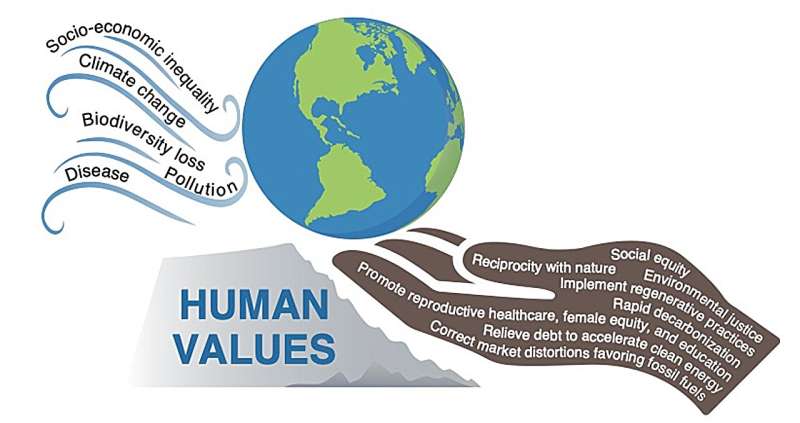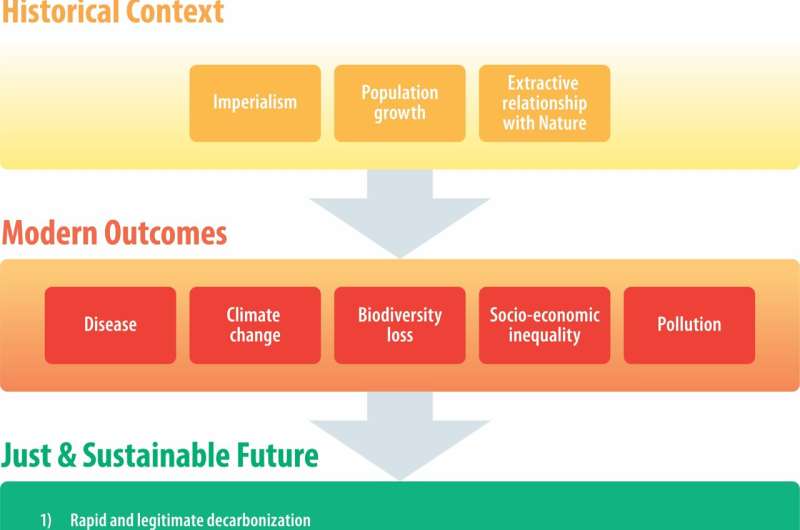This article has been reviewed according to Science X's editorial process and policies. Editors have highlighted the following attributes while ensuring the content's credibility:
fact-checked
peer-reviewed publication
trusted source
proofread
Scientists' urgent call: End destruction and forge a just, sustainable future

An international team of scientists has published a study in PNAS Nexus, emphasizing the urgent need to align political will, economic resources, and societal values to ensure a more sustainable and equitable world. Led by University of Hawai'i at Mānoa researchers, the 18 authors combine their expertise in Earth and ocean sciences, politics, law, public health, renewable energy, geography, communications, and ethnic studies to assess causes, impacts, and solutions to a multitude of worldwide crises.
"Climate change, ecological destruction, disease, pollution, and socio-economic inequality are pressing global challenges facing humanity in the 21st century," said Chip Fletcher, lead author and interim Dean of the UH Mānoa School of Ocean and Earth Science and Technology. "These crises are not isolated problems but are interwoven, exacerbate each other, and create amplifying feedbacks that pose a grave threat to both the environment and human well-being."
"Environmental and human health are inextricably linked," said David Karl, co-author and professor of oceanography at UH Mānoa. "Urgent and comprehensive action is called for, including rapid decarbonization, fostering a more harmonious relationship with nature, and equitable human development."
Global cultural shift
The authors argue that centuries of imperialism, extractive capitalism, and population growth have pushed Earth's ecosystems beyond their limits, and created a broadening pattern of social inequality. The review summarizes the grave threats facing the planet but rejects a "doom and gloom" philosophy. Instead, the authors argue, the threats should motivate swift and substantial actions.
According to the authors, a global economic model focused on wealth accumulation and profit, rather than true sustainability, is a major impediment to decarbonization, conserving natural resources, and ensuring social equity. Therefore, the authors argue, governments should enforce radical, immediate cuts in fossil fuel use, eliminate environmentally harmful subsidies, and restrict trade that generates pollution or unsustainable consumption.

The most vulnerable human populations, those who bear the least responsibility, disproportionately bear the consequences of these interwoven global crises. The broadening pattern of this inequity breeds displacement, disease, disillusionment, and dissatisfaction that ultimately erode social cohesion.
A grossly unequal distribution of wealth has coupled with the increasing consumption patterns of a rising global middle class to amplify ecological destruction. Studies show that the poorest half of the global population owns barely 2% of total global wealth, while the richest 10% owns 76% of all wealth. The poorest 50% of the global population contribute just 10% of emissions, while the richest 10% emit more than 50% total carbon emissions. Climate change, economic inequality, and rising consumption levels intertwine to amplify ecological destruction.
Marine and terrestrial biomes face critical tipping points, while escalating challenges to food and water access foreshadow a bleak outlook for global security. The consequences of these actions are disproportionately borne by vulnerable populations, further entrenching global inequities.
"To avoid these consequences, we advocate a global cultural shift that elevates kinship with nature and communal well-being, underpinned by the recognition of Earth's finite resources and the interconnectedness of its inhabitants," said Krista Hiser, professor of English at Kapiolani Community College at the University of Hawai'i.
Kinship with nature
The authors welcome signs that humanity is interested in changing its value system to prioritize justice and reciprocity within human societies and between humans and natural landscapes and ecosystems, which they see as the best route to true sustainability.
According to Phoebe Barnard, affiliate professor at the University of Washington, "The imperative is clear: To navigate away from this precipice, we must collectively harness political will, economic resources, and societal values to steer toward a future where human progress does not come at the cost of ecological integrity and social equity."
The authors call for a global cultural shift in values, aided by education, robust policy, economic incentives, cross-sector partnerships, community empowerment, corporate accountability, technological innovation, leadership, and cultural narratives delivered through art and media. They conclude that humanity must stop treating these issues as isolated challenges and establish a systemic response based on kinship with nature that recognizes Earth as our lifeboat in the cosmic sea of space.
More information: Charles Fletcher et al, Earth at risk: An urgent call to end the age of destruction and forge a just and sustainable future, PNAS Nexus (2024). DOI: 10.1093/pnasnexus/pgae106. academic.oup.com/pnasnexus/art … /3/4/pgae106/7638480
Journal information: PNAS Nexus
Provided by University of Hawaii at Manoa



















